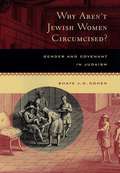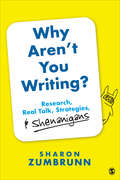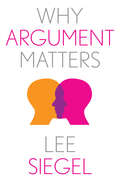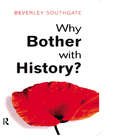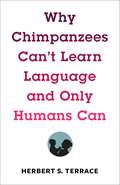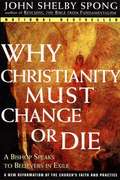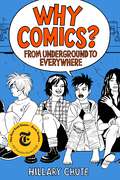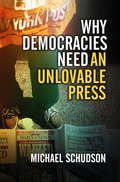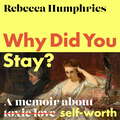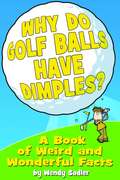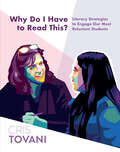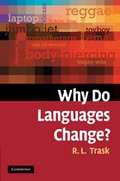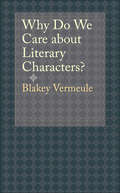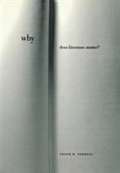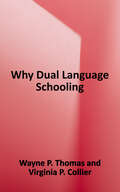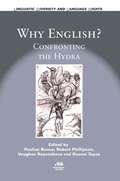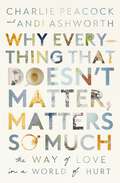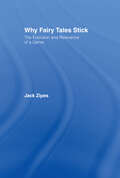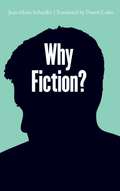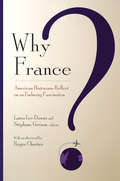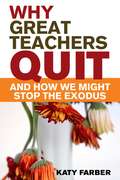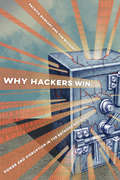- Table View
- List View
Whose News?
by Kalpana Sharma Ammu JosephWhose News?: The Media and Women's Issues (1994) quickly became an international classic which was widely used. The decade that has passed since its publication has witnessed dramatic developments in the media environment across the world. As a consequence, the coverage of gender issues in the media today has to be viewed and evaluated against the background of globalization in general and media globalization in particular. This is just what this new and updated edition of the pioneering book does. In particular, it addresses the set of questions that has arisen in recent years concerning women's access to the media and to information as users, their participation in media and communication structures, and their portrayal and perspectives in media content. This new edition retains its unique gender analysis of media content, and situates, views and evaluates the coverage of gender issues in the media within the context of recent trends in both the economy and the media industry. Employing a novel and nuanced methodology, it offers a distinctive view of the history of both the media and the women's movement in India as the 20th century gave way to the 21st. It also examines current media coverage of women's issues such as dowry-related violence, rape, sex selection, Muslim women's legal rights, and the practice of sati.
Why Aren't Jewish Women Circumcised? Gender and Covenant in Judaism
by Shaye J. D. CohenWith a lively command of a wide range of Jewish sources--from the Bible and the Talmud to the legal and philosophical writings of the Middle Ages to Enlightenment thinkers and modern scholars--Shaye J. D. Cohen considers the varied responses to this provocative question and in the process provides the fullest cultural history of Jewish circumcision available.
Why Aren’t You Writing?: Research, Real Talk, Strategies, & Shenanigans
by Sharon K. ZumbrunnWrite more with less pain! Why Aren’t You Writing?: Research, Real Talk, Strategies, & Shenanigans describes research on how bright and otherwise fairly normal people lose their minds when it comes to writing, and then shows the reader how to stop being one of those people. Author Sharon Zumbrunn designed this brief text for beginning and struggling academic writers so they can understand the psychological hang-ups that can get in the way of productivity. This book intertwines social and behavioral science research and humor to offer tips and exercises to help writers overcome their hurdles. Each chapter includes a description of findings from psychological and related research on writing hurdles and personal experiences of the writing process. Within the chapters, the author provides practical strategies and resources to help writers move beyond the challenges holding them back. Why Aren′t You Writing? acknowledges how emotionally and mentally challenging it can be to be a "writer." This book helps readers to balance the hard work required for change with a bit of levity often necessary for withstanding sustained difficult thinking and meaningful change. Together, the components of this text present a systematic approach for beginning and struggling academics to become aware of what might be happening in their heads when they (don’t) write, and harness that knowledge to build a healthier and more resilient relationship with writing.
Why Aren’t You Writing?: Research, Real Talk, Strategies, & Shenanigans
by Sharon K. ZumbrunnWrite more with less pain! Why Aren’t You Writing?: Research, Real Talk, Strategies, & Shenanigans describes research on how bright and otherwise fairly normal people lose their minds when it comes to writing, and then shows the reader how to stop being one of those people. Author Sharon Zumbrunn designed this brief text for beginning and struggling academic writers so they can understand the psychological hang-ups that can get in the way of productivity. This book intertwines social and behavioral science research and humor to offer tips and exercises to help writers overcome their hurdles. Each chapter includes a description of findings from psychological and related research on writing hurdles and personal experiences of the writing process. Within the chapters, the author provides practical strategies and resources to help writers move beyond the challenges holding them back. Why Aren′t You Writing? acknowledges how emotionally and mentally challenging it can be to be a "writer." This book helps readers to balance the hard work required for change with a bit of levity often necessary for withstanding sustained difficult thinking and meaningful change. Together, the components of this text present a systematic approach for beginning and struggling academics to become aware of what might be happening in their heads when they (don’t) write, and harness that knowledge to build a healthier and more resilient relationship with writing.
Why Argument Matters (Why X Matters Series)
by Lee SiegelAn impassioned case for argument&’s central role in human life, by one of America&’s most distinguished cultural critics &“An invigorating reflection on the nature and value of disagreement. . . . Sharp and taut. . . . A lesson in a well-constructed argument itself.&”—Publishers Weekly, starred review &“Perhaps more than any other commentary, Why Argument Matters illuminates the root causes of our partisan, venomous, irrational times—and yet somehow rescues from the morass the true nature of argument, its power and beauty.&”—Michael Wolff, author of Fire and Fury: Inside the Trump White House From Eve&’s crafty exchange with the serpent, to Martin Luther King&’s soaring, subtle ultimatums, to the throes of Twitter—argument&’s drainpipe—the human desire to prevail with words has been not just a moral but an existential compulsion. In this dazzling reformulation of argument, renowned critic Lee Siegel portrays the true art of argument as much deeper and far more embracing than mere quarrel, dispute, or debate. It is the supreme expression of humanity&’s longing for a better life, born of empathy and of care for the world and those who inhabit it. With wit, passion, and striking insights, Siegel plumbs the emotional and psychological sources of clashing words, weaving through his exploration the untold story of the role argument has played in societies throughout history. Each life, he maintains, is an argument for that particular way of living; every individual style of argument is also a case that is being made for that person&’s right to argue. Argument is at the heart of the human experience, and language, at its most liberated and expressive, inexorably bends toward argument.
Why Bother with History?: Ancient, Modern and Postmodern Motivations
by Beverley C. Southgate.Why Bother With History? argues for an increasingly important role for a revitalised historical study. Examining the motivations of past historians, the author rejects the ancient aspiration to a 'history for its own sake' and argues that historians' importance lies in their own adoption of a moral standpoint, from which a story of the past can be told, that facilitates the attainment of a future we desire. Inevitably controversial, in that it challenges many of the assumptions of modernist history, this is an interdisciplinary book, which draws in particular on psychology and literature.
Why Chimpanzees Can't Learn Language and Only Humans Can (Leonard Hastings Schoff Lectures)
by Herbert S. TerraceIn the 1970s, the behavioral psychologist Herbert S. Terrace led a remarkable experiment to see if a chimpanzee could be taught to use language. A young ape, named “Nim Chimpsky” in a nod to the linguist whose theories Terrace challenged, was raised by a family in New York and instructed in American Sign Language. Initially, Terrace thought that Nim could create sentences but later discovered that Nim’s teachers inadvertently cued his signing. Terrace concluded that Project Nim failed—not because Nim couldn’t create sentences but because he couldn’t even learn words. Language is a uniquely human quality, and attempting to find it in animals is wishful thinking at best. The failure of Project Nim meant we were no closer to understanding where language comes from.In this book, Terrace revisits Project Nim to offer a novel view of the origins of human language. In contrast to both Noam Chomsky and his critics, Terrace contends that words, as much as grammar, are the cornerstones of language. Retracing human evolution and developmental psychology, he shows that nonverbal interaction is the foundation of infant language acquisition, leading up to a child’s first words. By placing words and conversation before grammar, we can, for the first time, account for the evolutionary basis of language. Terrace argues that this theory explains Nim’s inability to acquire words and, more broadly, the differences between human and animal communication. Why Chimpanzees Can’t Learn Language and Only Humans Can is a masterful statement of the nature of language and what it means to be human.
Why Christianity Must Change or Die: A Bishop Speaks to Believers In Exile
by John Shelby SpongFrom back cover: [Spong presents his] controversial stands on the Bible, Jesus, theism, and ... [He calls] for a Christianity based on critical thought rather than blind faith, on love rather than judgment, and that focuses on life more than religion.
Why Comics?: From Underground to Everywhere
by Hillary ChuteFilled with beautiful full-color art, dynamic storytelling, and insightful analysis, Hillary Chute’s Why Comics? reveals what makes one of the most critically acclaimed and popular art forms unique and so appealing, and how it got that way. <p><p> Over the past century, fans have elevated comics from the back pages of newspapers into one of our most celebrated forms of culture, from Fun Home, the Tony Award–winning musical based on Alison Bechdel’s groundbreaking graphic memoir, to the dozens of superhero films that are annual blockbusters worldwide. What is the essence of comics’ appeal? What does this art form do that others can’t? <p> Whether you’ve read every comic you can get your hands on or you’re just starting your journey, Why Comics? has something for you. Author Hillary Chute chronicles comics culture, explaining underground comics (also known as “comix”) and graphic novels, analyzing their evolution, and offering fascinating portraits of the creative men and women behind them. Chute reveals why these works—a blend of concise words and striking visuals—are an extraordinarily powerful form of expression that stimulates us intellectually and emotionally. <p> Focusing on ten major themes—disaster, superheroes, sex, the suburbs, cities, punk, illness and disability, girls, war, and queerness—Chute explains how comics gets its messages across more effectively than any other form. “Why Disaster?” explores how comics are uniquely suited to convey the scale and disorientation of calamity, from Art Spiegelman’s representation of the Holocaust and 9/11 to Keiji Nakazawa’s focus on Hiroshima. “Why the Suburbs?” examines how the work of Chris Ware and Charles Burns illustrates the quiet joys and struggles of suburban existence; and “Why Punk?” delves into how comics inspire and reflect the punk movement’s DIY aesthetics—giving birth to a democratic medium increasingly embraced by some of today’s most significant artists. <p> Featuring full-color reproductions of more than one hundred essential pages and panels, including some famous but never-before-reprinted images from comics legends, Why Comics? is an indispensable guide that offers a deep understanding of this influential art form and its masters.
Why Democracies Need an Unlovable Press
by Michael SchudsonJournalism does not create democracy and democracy does not invent journalism, but what is the relationship between them? This question is at the heart of this book by world renowned sociologist and media scholar Michael Schudson. Focusing on the U.S. media but seeing them in a comparative context, Schudson brings his understanding of news as at once a story-telling and fact-centered practice to bear on a variety of controversies about what public knowledge today is and what it should be. Should experts have a role in governing democracies? Is news melodramatic or is it ironic – or is it both at different times? In the title essay, Schudson even suggests that journalism serves the interests of free expression and democracy best when it least lives up to the demands of media critics for deep thought and analysis; passion for the sensational event may be news at its democratically most powerful. Lively, provocative, unconventional, and deeply informed by a rich understanding of journalism’s history, this work collects the best of Schudson’s recent writings, including several pieces published here for the first time.
Why Did You Stay?: A memoir about self-worth (Karen Pirie #59)
by Rebecca Humphries'Fierce. Game-changing. Urgently necessary. Brilliant, brilliant and did I say brilliant?' EMMA THOMPSON 'Pacy, vivid, compelling and very, VERY funny ... it will help so many' MARIAN KEYES 'A fucking classic. Required reading for all women and men and I believe it's going to be the book of 2022' BRYONY GORDON 'Fuck, this is good. Every page feels important' LUCY VINE Actor, writer and hopeless romantic Rebecca Humphries had often been called crazy by her boyfriend. But when paparazzi caught him kissing his Strictly Come Dancing partner, she realised the only crazy thing was believing she didn't deserve more.Forced into victimhood by the story, Rebecca chose to reclaim her power, posting her thoughts on social media, including advice for other women who might be experiencing what she realised she'd managed to escape: a toxic, oppressive relationship. A flood of support poured in, but amongst the well-wishes was a simple question with an infinitely complex answer: 'If he was so bad, why did you stay?' Empowering, unflinching and full of humour, this book takes that question and owns it. Using her relationship history, coming of age stories and experiences since the scandal during Strictly, Rebecca explores why good girls are drawn to darkness, whether pop culture glamourises toxicity, when a relationship 'rough patch' becomes the start of a destructive cycle, if women are conditioned for co-dependency, and - ultimately - how to reframe disaster into something magical. 'The best [book] about relationships since Three Women' CAROLINE SANDERSON, THE BOOKSELLER 'So funny and heart-breaking. So stunningly written. For any woman who has been asked 'why did you stay?', Rebecca Humphries' book is a hilarious and brilliant read' SUSAN WOKOMA 'Very, very good' PANDORA SYKES 'A magical, magical book' GLAMOUR 'So thoughtful and moving and funny and sad and great, I love it so, so much. I resented having to put it down' DAISY BUCHANAN 'Her thought-provoking story should be required reading for anyone in a relationship' DAILY MIRROR 'A memoir every woman needs to read' RED MAGAZINE 'This book isn't an ice-cold revenge opus; it's a diary of self-discovery, a celebration of friendship, resilience and finding one's self-worth...is it worth the hype? Absolutely: I had to stop myself from reading it one grateful gulp' LAURA PULLMAN, STYLE
Why Do Golf Balls Have Dimples?: A Book of Weird and Wonderful Science Facts
by Wendy SadlerHave you ever wondered why golf balls have dimples or why your hair goes frizzy in the rain? Scientist Wendy Sadler has the answers in her book of Weird and Wonderful facts. Broken down into user-friendly chapters like sport, going out, the great outdoors, food and drink and the downright weird, Wendy gives the scientific answers to life's intriguing questions, like Why toast always lands butter side down Why you can't get (too) lost with a satnav.
Why Do I Have to Read This?: Literacy Strategies to Engage Our Most Reluctant Students
by Cris TovaniWhy do I have to read this?- What teacher doesn't dread this question? It usually comes from our most disengaged students a student who cries of boredom, or one who is angry or apathetic. When we don't know what else to try, it's easy to become frustrated and give up on these challenging learners. Author Cris Tovani has spent her career figuring out how to entice challenging students back into the process of learning. Why Do I Have to Read This?: Literacy Strategies to Engage our Most Reluctant Students Tovani shares her best secrets, lessons learned from big fails, and her most effective literacy and planning strategies that hook these hard to get learners. You will meet many of Tovani's students inside this book. As she describes some of her favorites, you may even recognize a few of your own. You will laugh at her stories and take comfort in her easily adaptable strategies that help students remove their masks of disengagement. She shows teachers how to plan by anticipating students' needs. HerC urriculumY ouA nticipate structures of Topic, Task, Targets, Text, Tend to me, and Time willhelp you anticipate your curriculum. InsideWhy Do I Have to Read This? readers will find: Literacy strategies for all content areas that support and engage a wide range of learners so they can read and write a variety of complex textReference charts packed with small bites of instructional shifts that coaches and teachers can use to quickly adjust instruction to re-engage studentsPlanning strategies that show teachers how to connect day-to-day instruction so that no day lives in isolationVersatile think sheets that are reproducible and adaptable to different grade levels, content areas, and disciplinesAbove all, Tovani gives teachers energy to get back into the classroom and face students who wear masks of disengagement. She reminds us of the importance of connecting students to compelling topics, rich text, useful targets, and worthy tasks. Teachers must tendto students' basic needs and helps us consider how to best structure instructional time.After reading this book, teachers will have new ways to connect with students in a deep, authentic way. Written in a humorous, compassionate, and wise voice,Why Do I Have to Read This? will provide answers to the pressing questions we have when we try to teach and reach all of our students.
Why Do Languages Change?
by Robert Mccoll Millar R. L. TraskThe first recorded English name for the make-up we now call blusher was paint, in 1660. In the 1700s a new word, rouge, displaced paint, and remained in standard usage for around two centuries. Then, in 1965, an advertisement coined a new word for the product: blusher. Each generation speaks a little differently, and every language is constantly changing. It is not only words that change, every aspect of a language changes over time - pronunciation, word-meanings and grammar. Packed with fascinating examples of changes in the English language over time, this entertaining book explores the origin of words and place names, the differences between British and American English, and the apparent eccentricities of the English spelling system. Amusingly written yet deeply instructive, it will be enjoyed by anyone involved in studying the English language and its history, as well as anyone interested in how and why languages change.
Why Do We Care about Literary Characters?
by Blakey VermeuleBlakey Vermeule wonders how readers become involved in the lives of fictional characters, people they know do not exist. Vermeule examines the ways in which readers’ experiences of literature are affected by the emotional attachments they form to fictional characters and how those experiences then influence their social relationships in real life. She focuses on a range of topics, from intimate articulations of sexual desire, gender identity, ambition, and rivalry to larger issues brought on by rapid historical and economic change. Vermeule discusses the phenomenon of emotional attachment to literary characters primarily in terms of 18th-century British fiction but also considers the postmodern work of Thomas Mann, J. M. Coetzee, Ian McEwan, and Chinua Achebe. From the perspective of cognitive science, Vermeule finds that caring about literary characters is not all that different from caring about other people, especially strangers. The tools used by literary authors to sharpen and focus reader interest tap into evolved neural mechanisms that trigger a caring response. This book contributes to the emerging field of evolutionary literary criticism. Vermeule draws upon recent research in cognitive science to understand the mental processes underlying human social interactions without sacrificing solid literary criticism. People interested in literary theory, in cognitive analyses of the arts, and in Darwinian approaches to human culture will find much to ponder in Why Do We Care about Literary Characters?
Why Does Literature Matter?
by Frank B. FarrellFrank B. Farrell defends a rich conception of the space of literature that retains its links to issues of self-formation and metaphysics and does not let that space collapse into just another reflection of social space. He maintains that recent literary theory has badly misread findings in the philosophy of language and the theory of subjectivity. That misreading, Farrell says, has tended to endorse ways of understanding literature that make one question why it matters at all. Farrell here opposes some recent theoretical trends and, through a mix of philosophical and literary studies, tells us why in his view literature does truly matter.
Why Dual Language Schooling
by Wayne P. Thomas Virginia P. CollierThis book provides the justification and research foundation for why the individual and/or community chooses dual language education. As their fourth book in the series, Drs. Collier and Thomas share foundational knowledge and experience with every family, board of education, business and community member who seeks to understand the exciting promise of K-12 dual language education.
Why English?: Confronting the Hydra
by Robert Phillipson Pauline BunceThis book explores the ways and means by which English threatens the vitality and diversity of other languages and cultures in the modern world. Using the metaphor of the Hydra monster from ancient Greek mythology, it explores the use and misuse of English in a wide range of contexts, revealing how the dominance of English is being confronted and counteracted around the globe. The authors explore the language policy challenges for governments and education systems at all levels, and show how changing the role of English can lead to greater success in education for a larger proportion of children. Through personal accounts, poems, essays and case studies, the book calls for greater efforts to ensure the maintenance of the world's linguistic and cultural diversity.
Why Everything That Doesn't Matter, Matters So Much: The Way of Love in a World of Hurt
by Charlie Peacock Andi AshworthA hopeful and practical model for what it means to be a Christian and a culture-maker in a world of hurt and wondrous possibility, from multi–Grammy winner Charlie Peacock and his wife and author, Andi Ashworth.Do you feel powerless and overwhelmed by the pain and suffering all around you? Have you ever asked, What can I do to mend the world, my family, or my own life? And if I could, why bother? Does my own small part even matter? If so, here comes hope from two guides who are further down the road. Charlie and Andi have written a collection of letters to Christians and spiritual seekers who think deeply and care acutely about the state of the world and their personal spheres of influence.In Why Everything That Doesn't Matter, Matters So Much, beloved and trusted mentors, Charlie and Andi offer you:Thought-provoking explorations into the many facets of Christian culture care and making, from the kitchen to Carnegie Hall.Practical guidance for how to care for and improve the quality of human life, locally and globally, no matter your vocation.A theology of imagination and creativity that provides a framework for all of life.A model for expressing love in marriage, friendship, citizenship, and every kind of work—even in the midst of cynicism, fear, exhaustion, and oppression. It might be said of Christians that our lives are either moving in the direction of the redemption Jesus has on offer, or away from it. Each of these letters is a gentle nudge in the direction of God's powerfully ordinary purpose for each of us, no matter what the future holds, to participate fully in the beautiful, redemptive work of Christ.
Why Fairy Tales Stick: The Evolution and Relevance of a Genre
by Jack ZipesIn his latest book, fairy tales expert Jack Zipes explores the question of why some fairy tales "work" and others don't, why the fairy tale is uniquely capable of getting under the skin of culture and staying there. Why, in other words, fairy tales "stick." Long an advocate of the fairy tale as a serious genre with wide social and cultural ramifications, Jack Zipes here makes his strongest case for the idea of the fairy tale not just as a collection of stories for children but a profoundly important genre. Why Fairy Tales Stick contains two chapters on the history and theory of the genre, followed by case studies of famous tales (including Cinderella, Snow White, and Bluebeard), followed by a summary chapter on the problematic nature of traditional storytelling in the twenty-first century.
Why Fiction? (Stages)
by Jean-Marie SchaefferOne of the most important works of narrative theory to come out of France in recent years―Jean-Marie Schaeffer understands fiction not as a literary genre but, in contrast to all other literary theorists, as a genre of life. The result is arguably the first systematic refutation of Plato’s polemic against fiction and a persuasive argument for regarding fiction as having a cognitive function. <P><P> For Schaeffer fiction includes not only narrative fiction but also children’s games, videos, film, drama, certain kinds of painting, opera―in short, all the intentional structures arising from shared imaginative reality. Because video games and cyber-technologies are the new sites of entry for many children into such an imagined universe, studying these cyber-fictions has become integral to our understanding of fiction. Through these avenues, Schaeffer also explores the foundations of mimeticism in order to explain the important effect fiction has on human beings. His work thus establishes fiction as a universal aspect of human culture and offers a profound and resounding answer to the question: Why fiction?
Why France?: American Historians Reflect on an Enduring Fascination
by Roger ChartierFrance has long attracted the attention of many of America's most accomplished historians. The field of French history has been vastly influential in American thought, both within the academy and beyond, regardless of France's standing among U.S. political and cultural elites. Even though other countries, from Britain to China, may have had a greater impact on American history, none has exerted quite the same hold on the American historical imagination, particularly in the post-1945 era. To gain a fresh perspective on this passionate relationship, Laura Lee Downs and Stéphane Gerson commissioned a diverse array of historians to write autobiographical essays in which they explore their intellectual, political, and personal engagements with France and its past. In addition to the essays, Why France? includes a lengthy introduction by the editors and an afterword by one of France's most distinguished historians, Roger Chartier. Taken together, these essays provide a rich and thought-provoking portrait of France, the Franco-American relationship, and a half-century of American intellectual life, viewed through the lens of the best scholarship on France.
Why Great Teachers Quit and How We Might Stop the Exodus: And How We Might Stop The Exodus
by Katy FarberLearn why today’s best teachers are leaving-from the teachers themselves.Low pay, increased responsibilities, and high-stakes standardized testing-these are just some of the reasons why more talented teachers are leaving the profession than ever before. Drawing on in-depth interviews with teachers all over the country, Katy Farber presents an in-the-trenches view of the classroom exodus and uncovers ways that schools can turn the tide.Farber's findings, which have been featured on Education Talk Radio, Vermont Public Radio, and in the Huffington Post, paint a sometimes shocking picture of life in today's schools, taking a frank look at Challenges to teacher endurance, including tight budgets, difficult parents, standardized testing, unsafe schools, inadequate pay, and lack of respect Strategies veteran teachers use to make sure the joys of teaching outweigh the frustrations Success stories from individual schools and districts that have found solutions to these challenges Recommendations for creating a school environment that fosters teacher retentionFeaturing clear analysis and concrete suggestions for administrators and policy makers, Why Great Teachers Quit takes you to the front lines of the fight to keep great teachers where they belong: in the classroom.
Why Hackers Win: Power and Disruption in the Network Society
by Patrick Burkart Tom McCourtWhen people think of hackers, they usually think of a lone wolf acting with the intent to garner personal data for identity theft and fraud. But what about the corporations and government entities that use hacking as a strategy for managing risk? Why Hackers Win asks the pivotal question of how and why the instrumental uses of invasive software by corporations and government agencies contribute to social change. Through a critical communication and media studies lens, the book focuses on the struggles of breaking and defending the “trusted systems” underlying our everyday use of technology. It compares the United States and the European Union, exploring how cybersecurity and hacking accelerate each other in digital capitalism, and how the competitive advantage that hackers can provide corporations and governments may actually afford new venues for commodity development and exchange. Presenting prominent case studies of communication law and policy, corporate hacks, and key players in the global cybersecurity market, the book proposes a political economic model of new markets for software vulnerabilities and exploits, and clearly illustrates the social functions of hacking.

